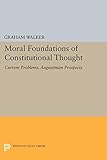Moral Foundations of Constitutional Thought : Current Problems, Augustinian Prospects / Graham Walker.
Material type: TextSeries: Princeton Legacy Library ; 1127Publisher: Princeton, NJ : Princeton University Press, [2014]Copyright date: ©1990Edition: Course BookDescription: 1 online resource (200 p.)Content type:
TextSeries: Princeton Legacy Library ; 1127Publisher: Princeton, NJ : Princeton University Press, [2014]Copyright date: ©1990Edition: Course BookDescription: 1 online resource (200 p.)Content type: - 9780691603308
- 9781400861446
- 342.73/02 347.3022 20
- KF4552
- online - DeGruyter
- Issued also in print.
| Item type | Current library | Call number | URL | Status | Notes | Barcode | |
|---|---|---|---|---|---|---|---|
 eBook
eBook
|
Biblioteca "Angelicum" Pont. Univ. S.Tommaso d'Aquino Nuvola online | online - DeGruyter (Browse shelf(Opens below)) | Online access | Not for loan (Accesso limitato) | Accesso per gli utenti autorizzati / Access for authorized users | (dgr)9781400861446 |
Frontmatter -- Contents -- Acknowledgments -- Introduction -- One. Normative Impasses in Contemporary Constitutional Theory -- Two. The Moral Anatomy of Contemporary Constitutional Theory -- Three. Augustine's Political Ethics: Skepticism, Ultimacy, and the Good in Politics -- Four. Augustinian Insight and Current Problems in Constitutional Thought -- Five. Augustinian Tensions and the Constitution of Liberalism -- Appendix -- Works Cited -- Index
restricted access online access with authorization star
http://purl.org/coar/access_right/c_16ec
Graham Walker boldly recasts the debate over issues like constitutional interpretation and judicial review, and challenges contemporary thinking not only about specifically constitutional questions but also about liberalism, law, justice, and rights. Walker targets the "skeptical" moral nihilism of leading American judges and writers, on both the political left and right, charging that their premises undermine the authority of the Constitution, empty its moral words of any determinate meaning, and make nonsense of ostensibly normative theories. But he is even more worried about those who desire to conduct constitutional government by direct recourse to an authoritative moral truth. Augustine's political ethics, Walker argues, offers a solution--a way to embrace substantive goodness while relativizing its embodiment in politics and law.Walker sees in Augustinian theory an understanding of the rule of law that prevents us from mistaking law for moral truth. Pointing out how the tensions in that theory resonate with the normative ambivalence of America's liberal constitutionalism, he shows that Augustine can provide successful but decidedly nonliberal grounds for the artifices and compromises characteristic of law in a liberal state.Originally published in 1990.The Princeton Legacy Library uses the latest print-on-demand technology to again make available previously out-of-print books from the distinguished backlist of Princeton University Press. These editions preserve the original texts of these important books while presenting them in durable paperback and hardcover editions. The goal of the Princeton Legacy Library is to vastly increase access to the rich scholarly heritage found in the thousands of books published by Princeton University Press since its founding in 1905.
Issued also in print.
Mode of access: Internet via World Wide Web.
In English.
Description based on online resource; title from PDF title page (publisher's Web site, viewed 30. Aug 2021)


